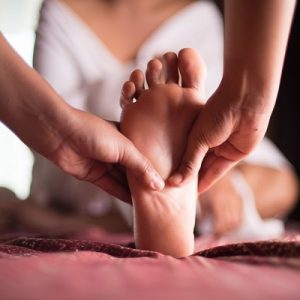 Some 2,500 ago and during Lord Buddha’s time in ancient India, a physician named Jivaka Komarabhacca developed a complex massage system which somehow ended up in Thailand where it was pass on by word of mouth from one generation to the next and is still practiced today in much the same way as it was so many centuries ago.
Some 2,500 ago and during Lord Buddha’s time in ancient India, a physician named Jivaka Komarabhacca developed a complex massage system which somehow ended up in Thailand where it was pass on by word of mouth from one generation to the next and is still practiced today in much the same way as it was so many centuries ago.
When the Thai alphabet was developed under King Ramkamhaeng the Great, scholars began recording all aspect of Thai society, culture and healing practices which, of course, included massage therapy.
Unfortunately, future generations had little left as almost all was destroyed when Thailand’s capital of Ayuthaya was captured by the Burmese invaders in 1776.
All that remained of the recorded ancient traditions was that which, under the directives of King Rama III who wanted to preserve as much as possible, was engraved on the walls of Wat Poh, one of the most famous temples in Bangkok.
Based on the ancient teachings regarding massage therapies, many different kinds are practiced in modern day Thailand. Foot massage is one of the most interesting of them all due to the fact that its principles are simple while its practice is quite a bit more complicated as the force which is applied to the foot by the massaging hands must be exceedingly accurate as it is directed toward particular nerves of the foot.
The Thai believe that each part of the foot has a direct link to another remotely located part of the body such as a vital organ or a system. Therefore, applying pressure and massaging a certain area of the foot influences the soft tissues of that particular area of the foot as well as the other.
As a general rule, the Foot massage is much more effective when the foot is bare as opposed to being clad with socks or stockings. There are several basic techniques that are used by just about every Foot massage therapist and they are:
Sweeping and Rubbing
Most Foot massages begin with bringing an increased supply of blood into the foot by rubbing its surface lightly but long enough to create the desired warmth and the rhythm of movement.
Thumb Walking
The thumbs are used to apply more direct and firm pressure to various parts of the foot as well as to loosen the tense tendons which run along the its outside edge.
Toe Rotation
The toes are very sensitive and care should be taken when manipulating them by either rotating each toe individually or by gently pulling them upwards and outwards while squeezing gently.
Kneading
Kneading is accomplished by firmly but not harshly pressing and rotating the knuckles of a fisted hand back and forth across the sole of the foot, from its heel to its toes.
Cupping
This is a simple squeezing of the entire foot with an up and down motion of one hand while cupping it with the other.
The benefits of a good Foot massage are many:
- Firmly pressing and massaging the base of the fourth toe heals an ailing heart.
- Pressing and massaging the base of the second toe stimulates the lungs and the bronchial system for improved breathing.
- Pressing and rolling the area between the first and second thumb relieves headaches.
- Massaging between the third and fourth toe relaxes tired eyes and improves vision.
- Stretching and pulling the big toe alleviates pain caused by sinusitis.
- Rotating pressure at the ball of the foot will ease stomachaches and heal the kidneys, the bladder and the entire excretory system.
- Applying pressure to the front of the heel delivers remedial effects to the male and female genital glands.
- Stretching the skin backwards and forwards under both sides of the anklebone is therapeutic to the reproductive tracts of men and women.
- Pulling the knuckle of any toe backwards along the instep eases spinal pain and improves posture.
- Holding the foot between two hands and rubbing the top of the foot between the first and second toe with one thumb which rubbing the top of the foot between the fourth and the fifth toe with the other, relieves pain of the inner ear and the chest.
- Massaging the inner and outer edges of the foot is beneficial to the diaphragm.
- Pushing and massaging the soft spot beneath the anklebone reduces the pain from the sciatic nerve and stimulates the lymphatic system to cleanse the body of bacteria and toxins.
- Enfolding and rotating the toes achieves overall relaxation and a sense of well-being.
- With so much pressing, massaging, rolling, gyrating, pulling, stretching and stroking; all the soft tissues of the foot itself become relaxed and invigorated.






